By Prof. Alemayehu G. Mariam
Abiy Ahmed is doing a great job for Ethiopia. Ethiopia is really having free press for the first time in its history. I have been in journalism since 1951. I have never experienced such freedom of expression in Ethiopia. Even government media are talking freely, which is a great thing for Ethiopia.” Yacob Wolde-Mariam, 90-year old Ethiopian journalist and editor (April 29, 2019).
If we do not temper press freedom with a little practical wisdom, I do not doubt that we will soon convert press freedom into a suicide pact in Ethiopia. Alemayehu G. Mariam
Author’s Note: This commentary has dual purpose: 1) to share my pride and joy over the extraordinary expansion of press freedom in Ethiopia over the past year and express heartfelt gratitude to all who have long fought to make press freedom possible, and 2) to plead for responsible journalism and caution about the probable consequences of abuse of press freedom.
Press Freedom Unbound in Ethiopia
![]()
For decades, Ethiopia was known for its crackdown, shutdown, clampdown, and closedown on press freedom.
For decades, Ethiopian journalists were told to let up, shape up, cover up, shut up, give up or you will be locked up.
In 2007, the Committee to Protect Journalists (CPJ), sometimes referred to as “”Journalism’s Red Cross”, in a letter asked U.S. Secretary of State Condoleeza Rice to look into critical “concerns regarding press freedom conditions” in Ethiopia and the “sustained record of contempt for independent media, which manifests itself in a variety of legal and administrative restraints”.
There was no respite in the “sustained record of contempt for independent media”, and in fact the regime of the Tigrean People’s Liberation Front (TPLF) continued to flagrantly violate press freedoms until it was ousted in 2018.
In its 2014 report, CPJ concluded, “A sharp increase in the number of Ethiopian journalists fleeing into exile has been recorded by the Committee to Protect Journalists in the past 12 months. More than 30–twice the number of exiles CPJ documented in 2012 and 2013 combined–were forced to leave after the government began a campaign of arrests.”
In 2015, Ethiopia was ranked the “4th most censored country in the world”.
In 2016, CPJ declared Ethiopia “to be among the top five worst jailers of journalists worldwide.”
In 2017, CPJ reported, “Ethiopian authorities are desperate to lock journalists away.”
In June 2018, CPJ wrote, “Allowing Ethiopians to access these news outlets is a positive sign that Prime Minister Abiy Ahmed is committed to delivering his promise to end Ethiopia’s censorship of the independent press.”
In April 2019, at the Washington Post-Reporters Without Borders’ open forum, Ethiopia was described as the “brightest light in the world for press freedom after Tunisia.”
The Washington Post tweeted, “Ethiopia jumped 40 spots on this year’s Index, an accomplishment that is credited to the work of the newly elected prime minister…”
On April 4, 2019, Reporters Without Borders concluded, “In the past year, Ethiopia has gone from being one of Africa’s biggest jailer of journalists, to being a country where journalists can now fulfil their role as a fourth estate and criticize the government without immediately being imprisoned…”
On April 29, 2019, CPJ wrote:
Ethiopia, which was one of the most-censored countries in the world and one of the worst jailers of journalists in sub-Saharan Africa, has gone through dramatic reforms under the leadership of Prime Minister Abiy Ahmed, who took office last April. In 2018–for the first time in 14 years–CPJ recorded no journalists behind bars in its annual census. And the country ended its block of over 260 websites and ban on media outlets forced to work in exile.
Then came the icing on the cake: The main celebration of the prestigious UNESCO World Press Freedom Day 2019 was held in Ethiopia on May 1-3. One hundred smaller events were held throughout the world.
Now you know why I take so much pride and joy from the fact that in one year Ethiopia has risen from the bottomless miry pit of the netherworld of press freedom pariahs to the majestic heights of press freedom.
My deepest gratitude and appreciation to all who made press freedom possible in Ethiopia
I enjoy publicly thanking people who do good for the community and humanity. To me, gratitude is the pinnacle of positive attitude.
As I think of thanking all the individuals and organizations who have made press possible, I just don’t know where to start.
But I must start with the person who made press freedom in Ethiopia real – touchable, palpable and an ordinary fact of life.
It took one extraordinary leaders and a global village of concerned individuals, groups and organizations to bring press freedom in Ethiopia.
I thank H.E. Prime Minister Dr. Abiy Ahmed for single-handedly delivering press freedom in Ethiopia. Within weeks in office, he emptied the country’s prisons of all political prisoners including journalists and busted wide open the political space.
P.M. Abiy has earned the respect, admiration and appreciation of a grateful nation for his extraordinary achievements.
I want to publicly thank so many other individuals, groups and organizations who have fought long and hard to make press freedom possible in Ethiopia. I wish I could list them all, but space will not allow me to do that. Apologies.
I thank Eskinder Nega and his wife Serkalem Fasil for their relentless struggle for press freedom in Ethiopia. Few have paid a greater price than Eskinder and Serkalem for press freedom in Ethiopia.
I thank Reeyot Alemu for her extraordinary courage and determination in standing up for press freedom and refusing to stand down and kneel before the TPLF ethno-apartheid masters.
I thank so many others who stood up for press freedom: Woubshet Taye, Temesgen Desalegn and Zone Nine bloggers, Solomon Kebede, Yesuf Getachew, Woubshet Taye, Saleh Edris, Tesfalidet Kidane and so many others.
I thank exiled Ethiopian journalists. They chose exile than to live a life of lies under the TPLF regime. Sadly, some did not live long enough to see this bright day of press freedom in Ethiopia.
I thank all of the journalists who were persecuted and unlawfully over the past decades for their extraordinary sacrifices.
I thank all of the international press freedom and human rights organizations. The work of the Committee to Protect Journalists, Reporters Without Borders, Human Rights Watch, Freedom House, Amnesty International and so many others have been instrumental in the press freedom we enjoy in Ethiopia today.
I thank U.S. Ambassador to Ethiopia Michael Raynor for his unambiguous declaration, “Supporting professional journalism in Ethiopia is a top priority for the United States.”
I wish to tell Ambassador Raynor this: The one quintessential thing Ethiopian press freedom needs today is capacity building. Without professional journalism, freedom of press in Ethiopia cannot be guaranteed.
My struggle for press freedom in Ethiopia
I am proud to say that I am second to none in fiercely, relentlessly and defiantly advocating for press freedom since 2006 when I first joined the Ethiopian human rights movement.
In October 2006, I organized a group of Ethiopian lawyers to issue a statement condemning, among other things,
the regime of Meles Zenawi [which] continues to harass, persecute and prosecute publishers, editors and journalists for publishing allegedly fabricated information and for other trumped up violations of the press law in violation of Art. 29 of the Ethiopian Constitution.
When Ethiopian Satellite Television (ESAT) was first established in April 2010, I served as the chairperson of the Advisory Committee.
I wrote ESAT’s Declaration of Principles, which was a robust and vigorous defense of universal press freedom:
ESAT is founded on the simple conviction that a free press is essential to an informed and enlightened citizenry, government transparency and accountability and equitable socio-economic development. We believe that a threat to press freedom is a threat to democracy, human rights and the rule of law. We reject the belief that by controlling what people read, hear and think, it is possible to control their hearts and minds…
Over the years, I have defended and advocated for the release of Eskinder Nega, whom I called “my personal hero”, and his wife Serkalem Fasil.
I have defended and advocated for the release of Reeyot Alemu whom I called “Reeyot Invictus”.
I have defended and advocated for the release of Woubshet Taye.
I have defended and advocated for the release of the Zone Nine bloggers.
I defended and demanded the release of Swedish journalists Martin Schibbye and Johan Persson who were sentenced to 11 years in prison on trumped up charges of “rendering support to terrorism.”
I even defended Dawit Kebede who claimed to go into exile on the pretext of government persecution only to return to the TPLF fold.
In September 2010, I vigorously defended the right of the late TPLF Capo Meles Zenawi to express himself and use the American press to disseminate his lies, damned lies and statislies (statistical lies).
When the TPLF abused state media to wage its campaign of fear, smear and demonization of Ethiopian Muslims as “terrorists”, I stood up and shredded that TPLF docutrash(documentary trash) called “Akeldama”.
I also shredded the other docutrash called “Jihadawi Harakat” when the TPLF tried to use state media to stoke the fires of Islamophobia by spreading fear and loathing between Christians and Muslims.
I stood with the Christian and Muslim faith leaders who fought back against the late capo di tutti capi (boss of all bosses) Meles Zenawi’s fear and smear campaigns using state media and urged them to show, “Unity in Divinity”. I praised Muslim and Christian religious leaders for reaching out to build bridges of unity in the struggle against the TPLF (D)EVIL.
The need for professionalism in the exercise of press freedom in Ethiopia
Ethiopia has many individuals who think they are journalists but lack the skills, ethics and professionalism of journalism.
They confuse “citizen journalism” with professional journalism.
In the internet age, there are those who think themselves to be “citizen journalists” because they can disseminate unverified, inaccurate and often misleading information using web sites, blogs, and social media.
Posting GiGo (garbage in, garbage out) information online does not make one a journalist.
Running around town and the countryside with a handheld video camera talking to passers-by also does not make one a professional journalist.
What Ethiopia needs today is “accountable journalism”.
That accountability comes from strict adherence to universal journalistic ethical standards.
Professional journalists always aim for truth and accuracy in reporting. It is important for them to get the facts right.
Professional journalists are independent and do not serve as handmaidens of social or political interests or advance their own agenda using their professional status.
Professional journalists are fair and impartial and present a balanced perspective.
Professional journalists, above all else, do not cause harm, which means they do not use their medium to bring strife and conflict in their communities. They hold themselves accountable to ethical standards, to their audience, to society and the law.
Today, what passes off as journalism in Ethiopia is a bunch of mischievous and unruly children playing with matchsticks in a thatched-roof hut.
Today, what passes off as journalism in Ethiopia is tabloid journalism filled with fake news, half-truths, gossip and sensational stories fanning extreme political views.
Today, what passes off as journalism in Ethiopia is yellow journalism which contains very little well-researched and documented stories but trying to attract readers with eye-catching headlines with exaggerations of news, scandals, etc.
Today, what passes off as journalism in Ethiopia is clickbait journalism which seeks to get viewers to click on a link online by providing just enough information to make readers curious. When a link is clicked, the website operators make a few cents in advertising.
Today, what passes off as journalism in Ethiopia is fake news journalism on social media intended to mislead and disinform with the aim of spreading fabricated, malicious and hateful information for political and partisan purposes.
Freedom is hard to gain but easy to lose: Beware how you handle press freedom
Those who abuse press freedom today should beware that the press freedom that is hard fought and won is very easy to lose.
Behold and learn from what has happened and is happening in the most democratic Western countries.
On May 2, 2019, Facebook permanently banned a number of controversial figures with large followings including Nation of Islam leader Louis Farrakhan, Infowars host Alex Jones, Milo Yiannopoulos and Laura Loomer. Social media companies are under legal threat and are weeding out propagators of “hate speech”.
On April 3, 2019, “Australia passed sweeping legislation Thursday that threatens huge fines for social media companies and jail for their executives if they fail to rapidly remove “abhorrent violent material” from their platforms.
On April 7, 2019, the British government “proposed sweeping new government powers to regulate the internet to combat the spread of violent and extremist content, false information and harmful material aimed at children.”
In November 2018, the French parliament “passed a controversial new law that would allow judges to order the immediate removal of online articles they deem to be fake news.”
In 2017, Germany has adopted a tough new law “NteDZ” which imposes fines of up to €50m if social media companies do not remove obviously illegal hate speech and other postings within 24 hours of receiving a notification.”
India has forced social media companies to adhere to “Voluntary Code of Ethics” and fight fake news for elections or face consequences.
China has built a “Great Firewall, the world’s most sophisticated system for controlling and surveilling the web.”
The U.S. Congress is grilling social media executives on their lack of control on their media.
There is a pending case in the U.S. supreme Court today that could have profound effect on internet liability for platform operators. There is concern that the Court may rule requiring social media and other platforms to curate content and give the government power to dictate content moderation rules and regulate what platforms can and can’t publish.
There is one unavoidable fact we must all face in the global regulatory response to press freedom.
Authoritarian and democratic governments are taking the hard line that they can pass their own laws to regulate what happens on the internet in order to protect their citizens.
This is the sign of the times!
The number of countries censoring the internet and clamping down on the press are increasing every day.
Press freedom, social media and the 2020 parliamentary election
In May 2020, Ethiopia will have its national parliamentary election.
I expect controversy involving the press and social media in the runup to the 2020 election. (I shall elaborate my concerns in a later commentary.)
For the limited purpose of this commentary, I merely wish to point out the general contours of my concerns.
I have reason to believe that the dregs of the TPLF regime currently in hideout in Mekele will undertake a major effort to disrupt, discredit, put in disarray and undermine the 2020 election using conventional and social media.
I expect the TPLF to
fully deploy its army of paid social media troll-troops to thwart, obstruct and prevent an orderly election process throughout the country;
saturate social media with fake news, fabricated stories, doctored photos and disinformation about the issues, individuals, groups and parties participating in the election;
use social media to fuel social and political conflict by spreading fake news with the aim of pitting one ethnic group against another and spreading fear and loathing in the election.
undertake a systematic campaign of distorting public statements, speeches and declarations of political leaders and parties, use them out of context and doctor them to incite communal, ethnic and sectarian violence and strife;
use social media to promote ethnonationalism, disunity and division in the country through the use of fake news and disinformation and
use YouTube videos extensively to spread fake news to create fear and alarm among the ordinary citizens and prevent them from voting and election participation.
I shall wager the Ethiopian Election Commission will need to undertake closer monitoring of social media platforms in anticipation of a massive TPLF onslaught to discredit and undermine the 2020 election.
Such monitoring is fast becoming a trend internationally.
In the 2019 parliamentary election (currently underway), the Indian government has required “Facebook and Twitter to impose a ‘silence period’ on political advertisements 48 hours before the polls and the Indian government is expected to closely monitor mobile phone communication. Google and other social media giants have also agreed not to allow their platforms to subvert the election.”
It will likely be necessary for the Ethiopian Election Commission to proactively address the foregoing issues with the various social media platforms.
Freedom of press should not be a matchstick in the hands of mischievous and unruly children
Children, and adults, who play with fire often get burned.
In Ethiopia, there are many children pretending to be journalists disseminating fake news, sensationalized stories and dangerous disinformation and hate speech masquerading as news, reporting and analysis.
But they should be very careful.
The tide is decidedly turning against press and media freedom in the world.
I lack the words to express my pride when I say Ethiopia, under the leadership of P.M. Abiy, is one of the few isolated islands where press freedom is exercised at maximum level in the world.
I am very proud that Ethiopia is at the very top of the list of countries in the world where press and internet freedom are uncensored, unobstructed and downright tolerated.
But I am afraid that the children playing with fire by abusing press freedom and social media will muck it up for the tens of millions of Ethiopians who seek to be informed and educated through the free and independent press.
I would like to be optimistic but children will always be children, be they children playing journalists or something else.
Oftentimes, the only time children learn about fire is after they get burned.
So, to those make-believe journalists in Ethiopia, I say, “Keep playing with social media matchsticks inflaming passions and inciting violence and you will not only set yourself on fire but also come under fire.”
I say, open your eyes!
Look at the sun setting on press freedom throughout the world.
Ethiopia is one of the very few bright lights of press freedom in the world.
Don’t muck it up! Don’t muck it up!
Those who seek to be real journalists should know that journalism is a profession just like law, medicine and engineering with required skill sets and standards.
You need to learn the techniques of journalism and perform journalistic duties with professionalism and ethical standards.
Before PM Abiy came, we all used to say, “Journalism is not a crime.”
After PM Abiy came, I am saying, “Journalism is not a game” of playing with tribal, communal and sectarian matchsticks!
On a personal note: Freedom of speech and press are not a suicide pact nor should make-believe journalists play Russian roulette
I believe in press and media that are defiantly independent, meticulously accurate and fiercely bold enough to investigate and criticize the government. Such robust media are absolutely essential for a functioning and thriving democracy.
But when newspapers, magazines, social media and other online outlets publish lies, gossip, fake news and disinformation that incites violence, hate, communalism, racism and sectarianism, I draw the line.
As a constitutional lawyer and teacher in America, I have spent more than three decades teaching, defending and advocating American civil liberties and nearly one-half of that Ethiopian and African human rights.
I have robustly and publicly defended the rights of those holding extreme views in America in their in their peaceful expression of their opinions, which I loath and despise.
I have robustly and publicly defended press freedom rights in Ethiopia and Africa.
I have learned a lot over the past nearly one-half century about the theory and practice of civil liberties in the classroom, the courtroom, the pressroom and the boardroom; and in the statehouse, the jailhouse and even the White House.
I do not believe the choice in Ethiopia is between press freedom and freedom of press without responsibility.
I share fully in the view of one of the greatest U.S. Supreme Court Justices, Robert H. Jackson, who argued that reasonable restraints on civil liberties are not impairments of the liberty of the citizen:
The choice is not between order and liberty. It is between liberty with order and anarchy without either. There is danger that, if the Court does not temper its doctrinaire logic with a little practical wisdom, it will convert the constitutional Bill of Rights into a suicide pact.
If we do not temper press freedom with a little practical wisdom, I do not doubt that we will soon convert press freedom into a suicide pact in Ethiopia.
Hear! Hear!
Those who abuse press freedom every day by propagating inflammatory and incendiary lies, fake news and disinformation to incite violence and strife in the conventional and social media should know they are playing a dangerous game of Russian roulette.
Let’s exercise responsible press freedom.
Let’s keep Ethiopia a shining beacon of press freedom to the world!
The post Behold Press Freedom Shining Bright in Ethiopia! appeared first on Satenaw: Ethioopian News & Breaking News: Your right to know!.

 They say there are two sides for every story. Unfortunately, the untold story of the blindfolded and gauged people Ethiopia remained captive by nonother than the elites and their sponsors more so by the self-ordained political representatives’ quest to sustain a grab for illegitimate power and resources of the people
They say there are two sides for every story. Unfortunately, the untold story of the blindfolded and gauged people Ethiopia remained captive by nonother than the elites and their sponsors more so by the self-ordained political representatives’ quest to sustain a grab for illegitimate power and resources of the people Paris, 2 May – Abiy Ahmed Ali, Prime Minister of the Federal Democratic Republic of Ethiopia, is named as laureate of the 2019 edition of the Félix Houphouët-Boigny Peace Prize for his actions in the region and, in particular, for having been the instigator of a peace agreement between the Federal Democratic Republic of Ethiopia and Eritrea.
Paris, 2 May – Abiy Ahmed Ali, Prime Minister of the Federal Democratic Republic of Ethiopia, is named as laureate of the 2019 edition of the Félix Houphouët-Boigny Peace Prize for his actions in the region and, in particular, for having been the instigator of a peace agreement between the Federal Democratic Republic of Ethiopia and Eritrea. The jury also recognizes the laureate’s worthiness for the reforms undertaken to consolidate democracy and social cohesion. Finally, the jury considers this distinction as an encouragement to pursue his commitment to the promotion of a culture of peace in the region and across the African continent.
The jury also recognizes the laureate’s worthiness for the reforms undertaken to consolidate democracy and social cohesion. Finally, the jury considers this distinction as an encouragement to pursue his commitment to the promotion of a culture of peace in the region and across the African continent. A giant rose farm, a soda works, and thousands of local farmers pay nothing for the water they take so freely from Ethiopia’s rivers and lakes, which are now drying up at terrifying speed.
A giant rose farm, a soda works, and thousands of local farmers pay nothing for the water they take so freely from Ethiopia’s rivers and lakes, which are now drying up at terrifying speed. by Mike Mamo
by Mike Mamo The facility, located in Gelan, Oromia Regional State, has a covered area of 10,500 meter square in a compound of 20,000 meter square. Euro Cable PLC, a joint Ethio-Turkish venture, was the first private enterprise to start manufacturing electrical cables in Ethiopia, the company said in its press statement.
The facility, located in Gelan, Oromia Regional State, has a covered area of 10,500 meter square in a compound of 20,000 meter square. Euro Cable PLC, a joint Ethio-Turkish venture, was the first private enterprise to start manufacturing electrical cables in Ethiopia, the company said in its press statement. Abiy was addressing a national gathering of Muslim leaders in the capital Addis Ababa as part of an ongoing conference that started last week.
Abiy was addressing a national gathering of Muslim leaders in the capital Addis Ababa as part of an ongoing conference that started last week.


 Dear Dr. Abiy,
Dear Dr. Abiy, Jawar Mohammed is acting like a king maker. He is the Aboy Sibhat Nega of OPDO who is leading perhaps many Oromo organizations behind; we can jokingly say that he is the Ayatollah of the Oromo elites who are inebriated with an imaginative alcohol of tribalism, a psychological drink that maddens with the love of political power and changes people to do anything under the sun to achieve it. The myopic Oromo elites such as Ato Tsegaye Aransa and his likes are currently fattening the conflicts through media access one of which is led by their fiendish friend Jawar Mohammed. OMN, the media Jawar is directing is preaching war especially on the Amharas, breaching the nominal laws of the nation. He is above the law; no one in the country has the right to take him accountable for what he and his media outlet do. Not only this, any Oromo opposition such as OLF can rob the country’s banks and yet none of them are questioned. OLF, OPDO, ODP, any O… that stands for Oromo “Liberation” is above the law nowadays. Leaders of some Oromo organizations have become the Mullahs of the nation. They do whatever they wish; no caprice of them remains restrained, thanks to the seizure of the federal portfolios in the hands of OPDO/ODP. Within a year, every Ethiopian has become ‘Oromian’. Almost all decisive positions of the federal structure have been transferred from TPLFite scoundrels to Oromo ruffians. This is also a proof that history repeats itself. Yea, Ethiopia is running backwards in a light year speed.
Jawar Mohammed is acting like a king maker. He is the Aboy Sibhat Nega of OPDO who is leading perhaps many Oromo organizations behind; we can jokingly say that he is the Ayatollah of the Oromo elites who are inebriated with an imaginative alcohol of tribalism, a psychological drink that maddens with the love of political power and changes people to do anything under the sun to achieve it. The myopic Oromo elites such as Ato Tsegaye Aransa and his likes are currently fattening the conflicts through media access one of which is led by their fiendish friend Jawar Mohammed. OMN, the media Jawar is directing is preaching war especially on the Amharas, breaching the nominal laws of the nation. He is above the law; no one in the country has the right to take him accountable for what he and his media outlet do. Not only this, any Oromo opposition such as OLF can rob the country’s banks and yet none of them are questioned. OLF, OPDO, ODP, any O… that stands for Oromo “Liberation” is above the law nowadays. Leaders of some Oromo organizations have become the Mullahs of the nation. They do whatever they wish; no caprice of them remains restrained, thanks to the seizure of the federal portfolios in the hands of OPDO/ODP. Within a year, every Ethiopian has become ‘Oromian’. Almost all decisive positions of the federal structure have been transferred from TPLFite scoundrels to Oromo ruffians. This is also a proof that history repeats itself. Yea, Ethiopia is running backwards in a light year speed.










 As we know, the Amaras have been massacred and displaced in every corner of Ethiopia for the last 42 years. The massacre and the displacement of Amaras has continued in greater magnitude, but many including some impotent Amara elites blame ethnic politics and the newly established defendant Amara groups for these atrocities. Because ethnic politics and the victimized Amaras are always blamed for these atrocities, no one is held accountable for the tens of thousands of lives perished, and the millions of innocents tortured, sterilized and displaced for 42 years.
As we know, the Amaras have been massacred and displaced in every corner of Ethiopia for the last 42 years. The massacre and the displacement of Amaras has continued in greater magnitude, but many including some impotent Amara elites blame ethnic politics and the newly established defendant Amara groups for these atrocities. Because ethnic politics and the victimized Amaras are always blamed for these atrocities, no one is held accountable for the tens of thousands of lives perished, and the millions of innocents tortured, sterilized and displaced for 42 years.



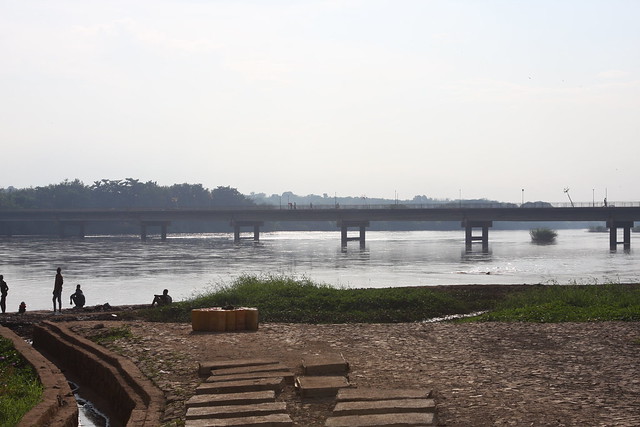
 The brown waters of the Baro River meandering through the Ethiopian city of Gambella—from which the surrounding region takes its name—coupled with an atmosphere of tropical languor creates an almost cliched archetype of the Western idea of an African river port. Except for the fact that there is not a single boat on the river. The 2013 outbreak of civil war in South Sudan, whose border lies 50 kilometres from the city, put an end to the thriving trade that once plied this waterway between Gambella and Juba, the South Sudanese capital. Credit: James Jeffrey/IPS
The brown waters of the Baro River meandering through the Ethiopian city of Gambella—from which the surrounding region takes its name—coupled with an atmosphere of tropical languor creates an almost cliched archetype of the Western idea of an African river port. Except for the fact that there is not a single boat on the river. The 2013 outbreak of civil war in South Sudan, whose border lies 50 kilometres from the city, put an end to the thriving trade that once plied this waterway between Gambella and Juba, the South Sudanese capital. Credit: James Jeffrey/IPS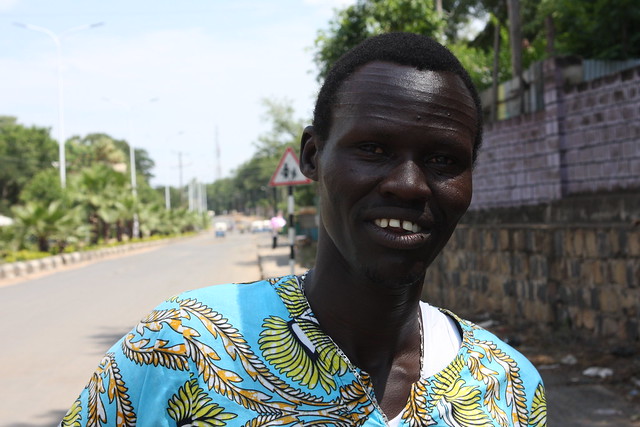
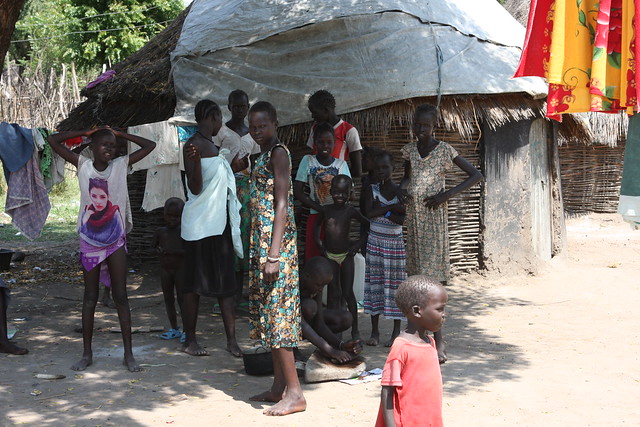
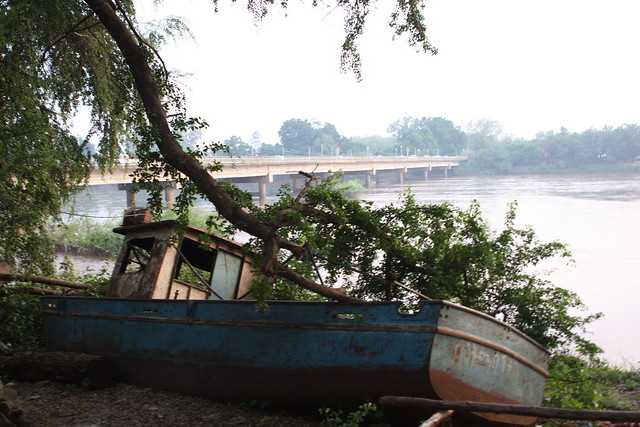
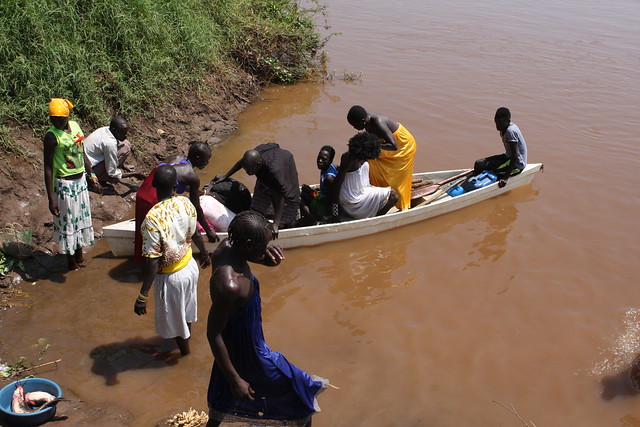
 Gambella city has an intriguing modern history, in which the Baro River plays a crucial part. In the late 19th century, Britain came knocking, seeing the Baro’s navigable reach to Khartoum as an excellent highway for exporting coffee and other produce to Sudan and Egypt. The Ethiopian emperor granted Britain the use of land for a port and Gambella was established in 1907. Only a few hundred hectares in size, this tiny British territory became a prosperous trade centre as ships from Khartoum sailed regularly during the rainy season when the water was high. The Italians captured Gambella in 1936 but it was back with the British after a bloody battle in 1941. Gambella became part of Sudan in 1951, but was reincorporated into Ethiopia five years later. Credit: James Jeffrey/IPS
Gambella city has an intriguing modern history, in which the Baro River plays a crucial part. In the late 19th century, Britain came knocking, seeing the Baro’s navigable reach to Khartoum as an excellent highway for exporting coffee and other produce to Sudan and Egypt. The Ethiopian emperor granted Britain the use of land for a port and Gambella was established in 1907. Only a few hundred hectares in size, this tiny British territory became a prosperous trade centre as ships from Khartoum sailed regularly during the rainy season when the water was high. The Italians captured Gambella in 1936 but it was back with the British after a bloody battle in 1941. Gambella became part of Sudan in 1951, but was reincorporated into Ethiopia five years later. Credit: James Jeffrey/IPS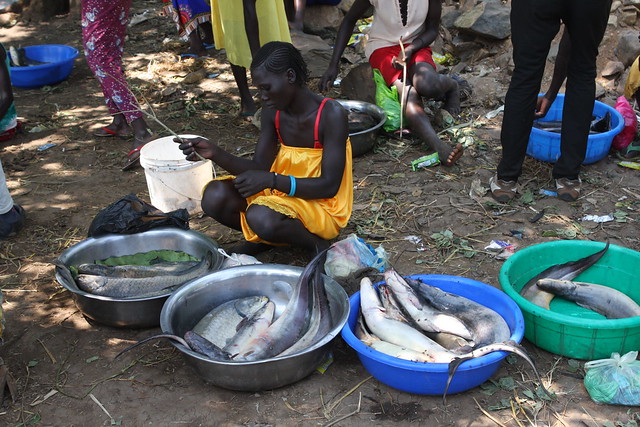
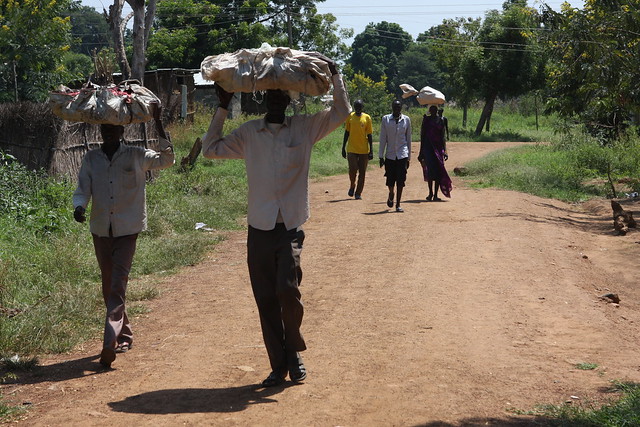
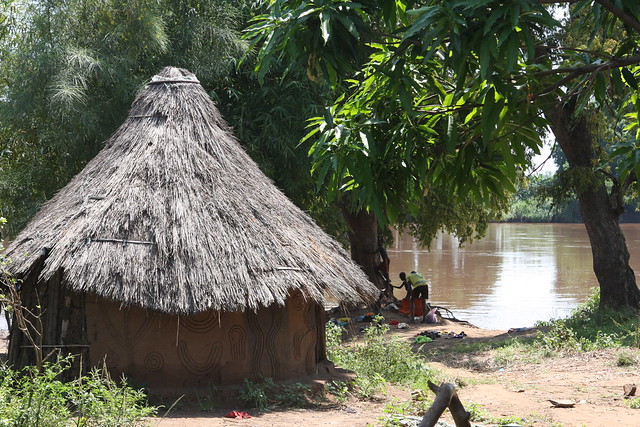
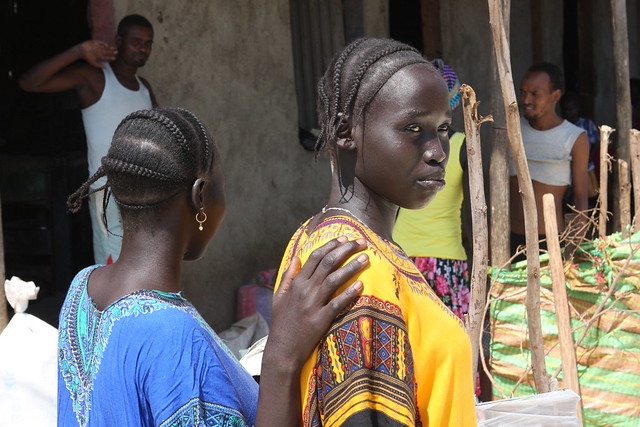
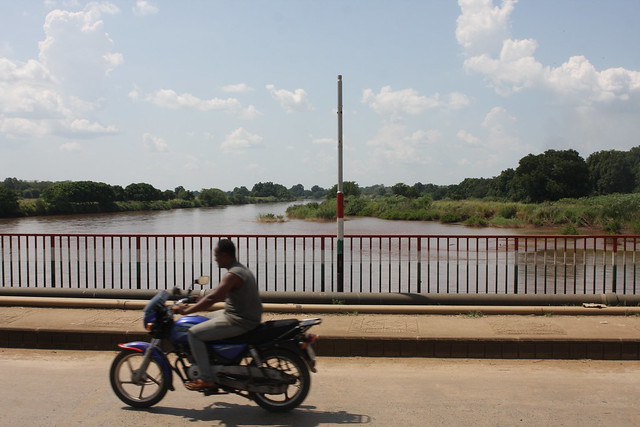
 A man who police say fled to his native Ethiopia more than two years ago after the killing of a young couple in Northern Virginia has been arrested and charged in their deaths.
A man who police say fled to his native Ethiopia more than two years ago after the killing of a young couple in Northern Virginia has been arrested and charged in their deaths.
